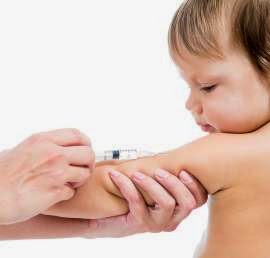Younger Generations More Likely to Think Vaccines Are Unsafe
Public health officials say the United States is
experiencing a resurgence of measles because some parents are opting out of the
recommended vaccines for their kids. The results of a new survey might help
explain why that is.
A Pew poll found that 83 percent of adults in the
United States view vaccines — such as the measles, mumps and rubella (MMR)
vaccine — as safe for healthy children. (Nine percent said they thought such
vaccines were unsafe; seven percent said they didn't know.) But those figures
change depending on the age of the person you ask.
Ninety percent of adults ages 50 and older are
confident in the safety of vaccines, the poll found. That number slides to 81
percent among adults ages 30 to 49, and then down to 77 percent for adults ages
18 to 29, according to the survey, which was released yesterday (Feb.
9). [Measles Outbreak, Measles Vaccine: Top Questions Answered]
Dr. William Schaffner, an infectious disease specialist at
Vanderbilt University Medical Center in Nashville, Tennessee, said he wasn't
surprised by the poll's results. The older that people are, the more likely
they are to take measles seriously and grasp the importance of the measles vaccine, Schaffner said.
"Particularly if you get into the gray-haired group
— that group has all seen measles," Schaffner told Live Science.
"They know about it and respect it and even, in a sense, fear it.
"If you lived during that era when the vaccine was
introduced, you could see measles melt away in front your eyes," Schaffner
added. "But today's parents have not seen measles, and they weren't taught
about measles in school. You could understand why it is that they're puzzled by
it."
Measles is a highly contagious viral respiratory
disease. Though its symptoms are somewhat similar to those of a bad cold (with
the addition of a characteristic rash), measles can lead to much more serious
complications, such as pneumonia and encephalitis (a swelling of the tissues
that surround the brain and spinal cord). One or two out of every 1,000
infected children will die, according to the Centers for Disease Control and
Prevention (CDC).
Measles was thought to be eradicated in the United States in
2000, but cases have been on the rise. Last year, the nation saw more than 600
measles cases — the most in two decades. In January 2015 alone, there were more
than 100 measles cases, most of them linked to an outbreak that began at
Disneyland in California in mid-December.
Schaffner said today's younger adults tend to be more
skeptical of authority and the idea that they are obliged to do something.
Younger people are also more likely to go to the Internet to find information
about health — and they might not always land on the most reliable websites, he
said.
"If you're wary of authority," Schaffner said,
"you won't go to the CDC website or the American Academy of Pediatrics
website," which are places with trustworthy information, and where doctors
say the MMR vaccine is safe and effective.
The new survey, which was conducted Feb. 5-8 among 1,003
adults, let the respondents who said they thought the MMR vaccine was unsafe to
explain why — but no clear theme emerged, the researchers said. Some people
said they distrusted pharmaceutical companies. Other people seemed to be
suspicious of how vaccines work.
People's levels of education also seemed to be a factor that
affected their attitudes about vaccines. Among college graduates, 92 percent of
those polled said they view MMR vaccines as safe for healthy children, while 85
percent of those with some college experience said the same, and 77 percent of
adults with a high school degree or less agreed.
Schaffner said he believes more work is needed to teach kids
about vaccines, especially because most health curriculums for children in
middle school and high school no longer include "those old bad diseases
that are now gone.
"It's no wonder that if you're not taught about these
things in school, when you become a parent you're scratching your head,"
Schaffner said.
Follow Megan Gannon on Twitter and Google+. Follow
us@livescience, Facebook& Google+.
Original article on Live Science.









0 comments:
Speak up your mind
Tell us what you're thinking... !